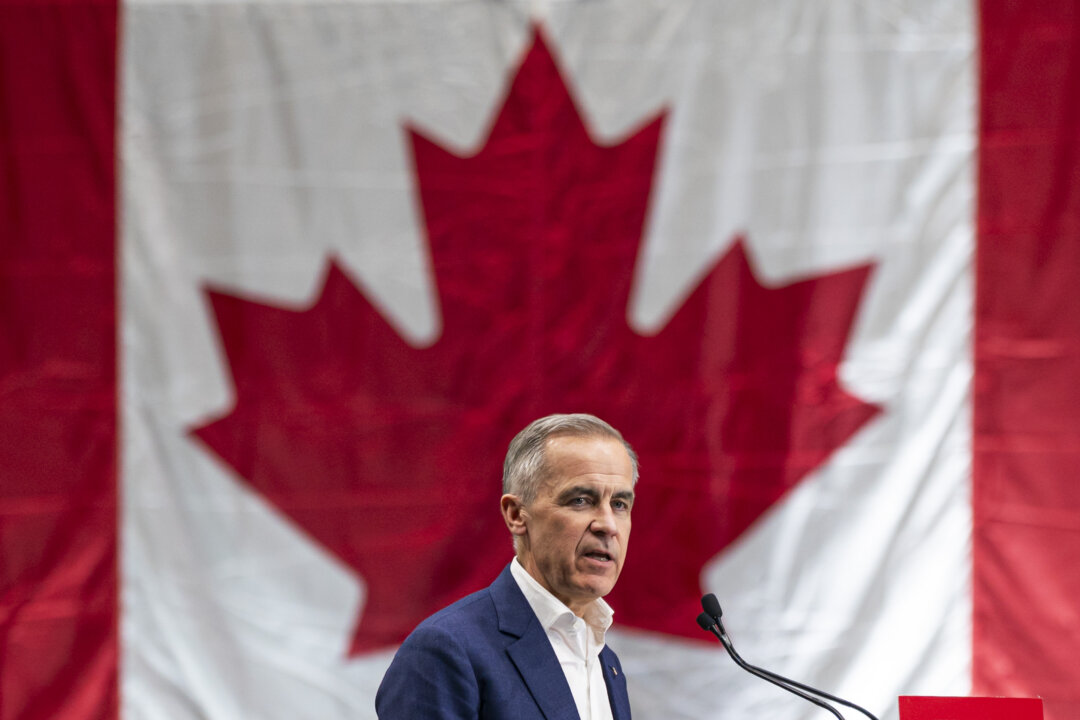News Analysis
Prime Minister Mark Carney was elected after running a campaign heavily focused on saying U.S. President Donald Trump poses an existential threat to Canada, but it remains to be seen whether this messaging will continue now that the election has passed.
The Liberals tapped heavily into rising nationalist sentiment in Canada, caused by Trump’s talk of making the country the 51st U.S. state and by the imposition of three different sets of tariffs on its largest trading partner.
Stoking patriotism had not been a major card of the Liberals under Prime Minister Justin Trudeau, who had started his mandate in 2015 by telling the New York Times there was no “core identity” in Canada, making it the “first post-national state.”
More criticism of the country came later with the growing influence of social justice ideology in government. Trudeau accepted the “genocide” finding of the National Inquiry into Missing and Murdered Indigenous Women and Girls in 2019, and vowed to root out “systemic racism” in Canada after the murder of George Floyd in the United States in 2020.
Trudeau also ordered flags to be flown at half-mast for more than five months in 2021 in response to claims by some First Nations of ground-penetrating radar pointing to the possibility of unmarked graves at former residential schools. So far no excavations have found remains. During this period, statues of Canada’s founding father John A. Macdonald were toppled, removed, or hidden. He was also cancelled from federal websites.
This critical perspective on Canada’s history and current society was absent as the Liberals focused their campaign on national pride and sovereignty following Trump’s 51st state comments.
“A new Liberal government will never cower to President Trump’s attacks on Canada. In this kind of crisis, protecting Canada’s identity is part of securing Canada,” Carney declared during the campaign.
With the new mandate secured, now comes the daunting task of entering negotiations with the Trump administration on the most pressing issue of trade, but also on security and defence.
It remains to be seen if Trump will continue his comments about making Canada the 51st U.S. state after the election and during the negotiations. He raised it on election day April 28 on his Truth Social platform, but didn’t issue a post after the election.
Carney had also maintained his anti-Trump messaging until the very end of campaign, repeating in his victory speech his slogan that “Trump is trying to break us, so that America can own us.”
Trump congratulated Carney on his election win on April 29. During an April 30 cabinet meeting, Trump called Carney a “very nice gentleman” and said he would come to the White House “very shortly, within the next week.”
Referring to Carney and Conservative Leader Pierre Poilievre, Trump added, “They both hated Trump, and it was the one that hated Trump I think the least that won.”A Liberal strategist told The Epoch Times in an interview he expects Carney to change his messaging post-election with negotiations looming.
“I don’t believe that particular messaging around the relationship with the United States being ‘over’ will remain a major theme of the prime minister’s communications efforts,” said Charles Bird, principal at Earnscliffe Strategies.
Carney said on the campaign trail and in his victory speech that Canada’s “old relationship with the United States, a relationship based on steadily increasing integration, is over.”
Bird added, however, there is “more than a bit of truth” to the assertion that the old relationship between Canada and the United States is over and that it’s understandable people have concluded that the southern neighbour is “not a reliable partner.”
“But there’s little to be gained on the part of the government in making the point repeatedly that we no longer regard you as the close ally we once did,” said Bird, who added he thinks the emphasis will instead be placed on finding ways the two countries can work together effectively.
This had been the core message of the Liberal government in public and in private after Trump was elected and before the Canadian general election, as it sought to avoid the punitive tariffs.
Stephen LeDrew, former Liberal Party president, also believes there’s no incentive for Carney to maintain an adversarial approach to the United States.
“I don’t think that Canadians would accept that the relationship is over,” LeDrew told The Epoch Times in an interview. He said Americans he has spoken with also value the relationship with Canada and want to work together.
LeDrew said that in any case, Trump is “holding all the cards” and there isn’t going to be a “huge policy initiative” from the Liberal government on how to deal with Trump.
“Why would Carney do that? I think Carney is busy making his own government, getting things to run better, and he will deal with Trump when Trump starts to squawk again.”

